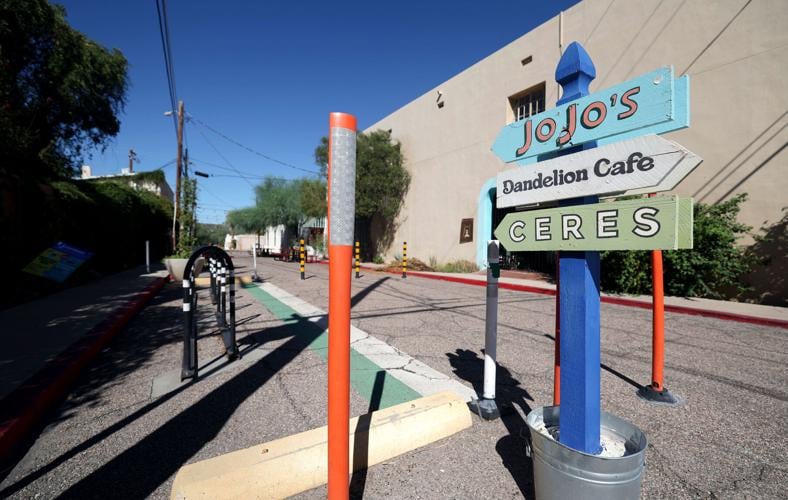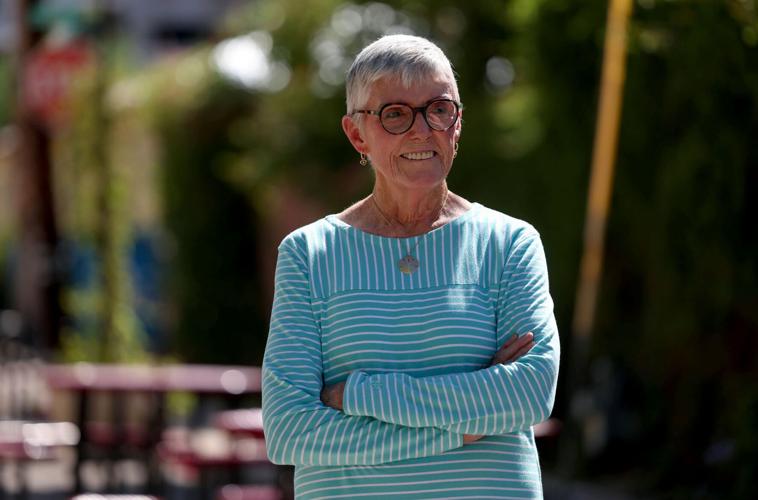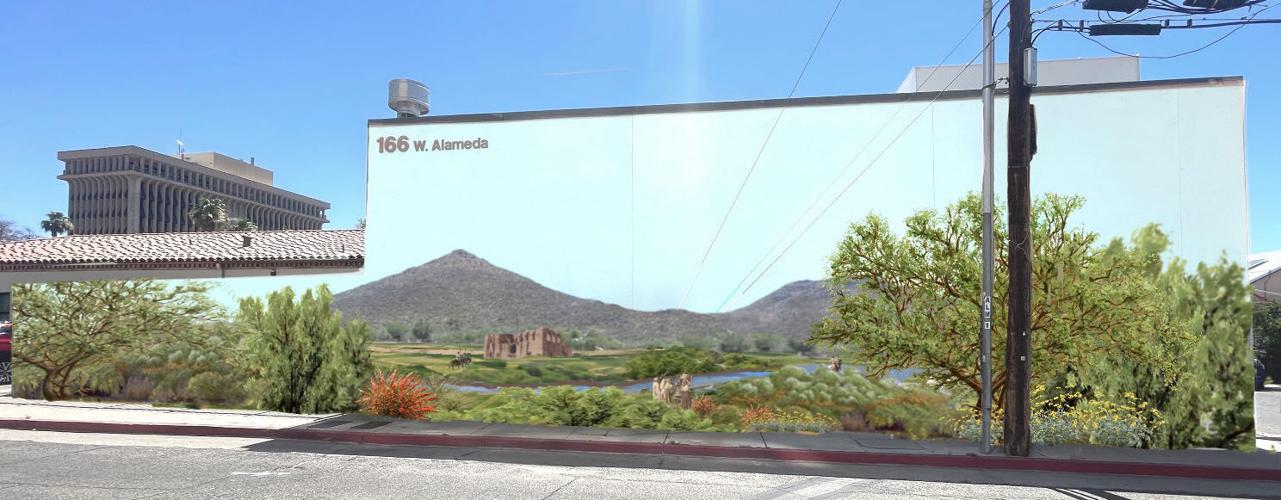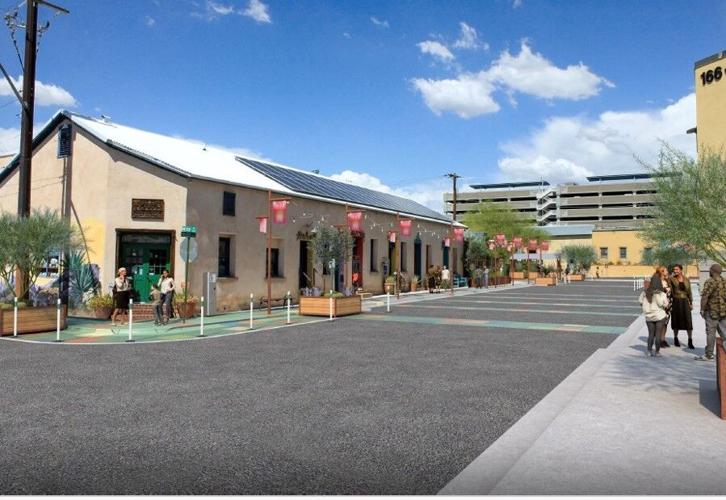Overlooked for years, Tucson’s oldest neighborhood may soon be rediscovered.
A project fueled by volunteers and local business owners will see El Presidio Historic District become a pedestrian haven with sidewalk dining, adult and children’s playgrounds and murals to replace bland walls.

Washington Street will permanently become a pedestrian haven under a new plan to close the road to cars and add murals, playgrounds and sidewalk tables for visitors.
Bordered by Sixth Street, Alameda Street, Granada Avenue and Church Avenue, the district is about 12 blocks from downtown and home to over 80 architecturally significant homes built between the mid-1800s and 1912, historic records show.
It is also home to the Presidio San Agustin del Tucson, a reconstruction of the original Spanish fort.
The project, called Activate El Presidio, hopes to draw more people to the local businesses and highlight the history of Tucson within the project borders of Church Avenue, Main Avenue, Alameda Street and Franklin Street.
Washington Street, between Court and Meyer avenues, will be closed to traffic with movable furniture on the north side for emergency vehicle access.
An adult playground will feature games such as horseshoes and cornhole, and a children’s playground will be the centerpiece so parents can sit at a table with a cup of coffee and keep an eye on the kiddos, said Jannie Cox, who headed up the five-year effort on behalf of Rio Nuevo along with Amy Hartmann-Gordon, chairman of the working group, to get the project done.
“We thought wouldn’t it be amazing to make this wonderful, historic neighborhood more inviting to pedestrians,” she said. “This project is so different from anything they’ve ever seen.”

Jannie Cox headed up the five-year effort on behalf of along with Amy Hartmann-Gordon, chairman of the working group, to bring the project to fruition.
Along Washington Street, there will be designs on the sidewalks painted in colors that match the old Pima County Courthouse dome, and there will be five eating stations with 48 seats that dot the sidewalks on the south side, Cox said.
The local businesses in the neighborhood are El Charro, Ceres, JoJo’s, Café a la C’Art and Dandelion Cafe & Bakery.
El Charro restaurant could benefit from more pedestrians feeling comfortable in that neighborhood after dark, Cox said, so festoon lights and planters will be installed leading up the restaurant’s entrance.

This rendering of the Activate El Presidio project shows Washington Street at Court Avenue.
“Our vision is that when we draw people to that street, people are going to look around and say, ‘I’m going to buy that building and put a business in there,’” she said. “We want to draw the people with the temporary improvement to attract permanent improvement.”
Two murals have been commissioned.
The 11-story Transamerica building will be adorned with a giant saguaro mural by Joe Pagac, funded by local philanthropist Jeanne McDonald. The cooling tower at the Tucson Museum of Art will be walled off with another mural entitled “Looking Back” by artist Bill Singleton that shows the view one would have had in the early 1800s from that spot before buildings were there.

The 11-story Transamerica building will be adorned with a giant saguaro mural by Joe Pagac.
Cox said the hope is that people who work downtown will discover this adjacent gem.
“It’s just so quiet over there,” she said. “Our goal is to bring families downtown after 5 o’clock.”
While the project was ultimately embraced by residents of the El Presidio, there was some hesitation when it was first proposed, said Guy Dobbings, co-president of the neighborhood association.
“This wasn’t a slam dunk,” he said. “There was some very vocal resistance from residents who thought we don’t need to be activated.”
Donations from neighbors and local businesses that were matched dollar-for-dollar by a donor and a $500,000 boost from the Rio Nuevo board helped keep the conversation moving forward.
“It will give local residents more fun things to do,” Dobbins said. “If you go by JoJos and there’s 20 people there instead of five people, that’s a great thing.”
In November 2023, nervous about the final vote on project, the neighborhood voted unanimously to support it.
“We have some of the best history to offer of the whole city,” Dobbins said. “There’s no reason not to share the great neighborhood that it is.”

Construction on the Activate El Presidio project is expected to begin within a month and be completed by the end of the year.
History of El Presidio
Colonel Hugo O’Connor platted the El Presidio in 1775. Spanish, Mexican and Native American people built the facility, historical records show.
A few of the homes survive on what remains of the old fort. The fort’s perimeter is generally bordered by Church, Pennington, Washington and Main Street.
The fort boasted of walls that were 3 feet thick and 12 feet high. Raised bastions at the northeast and southeast corners created an impressive site. In total, the fort encompassed about 10 acres.
The population increased, and ownership changed from Spanish to Mexican in 1821. However, the low, flat-roofed adobe buildings in Tucson remained the same.
La Casa Cordova is the oldest known adobe home in the city of Tucson within the area enclosed by the Presidio wall.

This rendering shows how the cooling tower at the Tucson Museum of Art on Alameda St. will be walled off for a mural entitled “Looking Back” by artist Bill Singleton. The piece will show the view one would have had in the early 1800s from that spot before buildings were there.
El Presidio became a historical district in 1975.
Construction on the Activate El Presidio project is expected to begin within a month and be completed by the end of the year.









